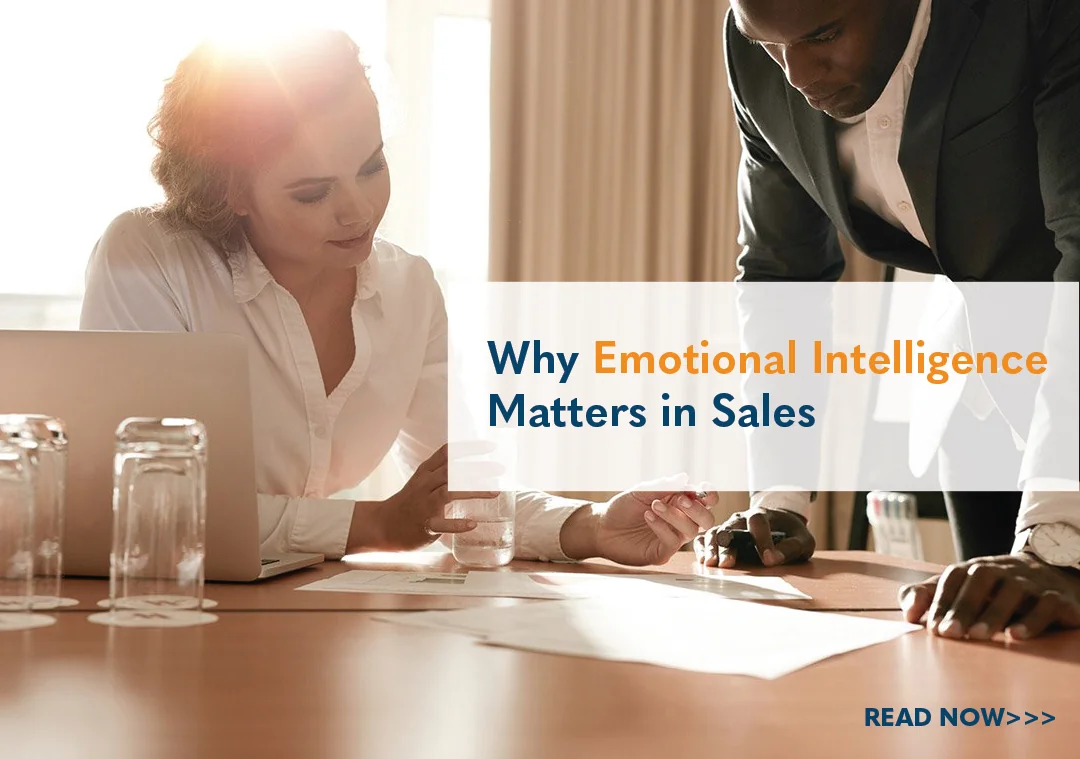Why Emotional Intelligence Matters in Sales

Emotional intelligence, or EQ (short for emotional quotient), has been a buzzword in the business world, and more specifically in sales, for several years. By definition, EQ describes the ability to recognize and regulate emotions within yourself and to recognize and respond to the emotions of others. Practically speaking, with a high EQ, sales professionals can recognize how our emotions and the emotions of others impact the actions that we take during the sales process. We can use knowledge of emotions to influence how others behave. In short, EQ has had an enormous impact on the sales culture.
What the Research Shows
- EQ is linked to sales outcomes. Various research studies have shown the difference that EQ has on sales outcomes. A Baylor University research study revealed that Coca-Cola trained sales leaders in emotional intelligence and discovered that these individuals exceeded their performance targets by 15% while leaders who did not develop emotional capabilities missed their targets by the same margin. Another company, Hallmark Communities, revealed that sales associates who acquired higher levels of EQ were 25% more productive than their colleagues with lower EQ.
- Customer satisfaction and repeat business are directly linked to the emotional connection that a customer can feel with a salesperson. A seller with high EQ has the ability to quickly recognize customer needs. What’s more, customers who like their salesperson are twelve times more likely to continue to purchase, according to Gallup research.
EQ In Sales
We also want you to think about EQ in terms of the real world. Wouldn’t you rather do business with a sales person who is pleasant, friendly, and has strong social skills that make you feel comfortable? You can see these qualities in many business and political leaders who may not necessarily possess all the technical knowledge and expertise to get the job done, but they can socialize and network in ways that benefit their personal and professional lives as well as those they interact with.
What Does Sales Success Look Like?
Jamie Dimon, CEO of JP Morgan Chase, once said to a group of graduate students: “Your IQ’s are all high enough for you to be very successful, but where people often fall short is on the EQ. It’s something you develop over time. A lot of management skills are EQ, because management is all about how people function.”
Daniel Goleman, who wrote several books on EQ, breaks this form of intelligence into five critical areas, and how they apply to sales professionals:
- Self-awareness, which is relevant to sales professionals because they need to be self-aware of their strengths and weaknesses.
- Self-regulation, which is relevant to sales professionals because they must be able to control their emotions and exercise restraint when needed.
- Motivation, which is relevant to sales professionals because they must be motivated by factors other than money, and show resilience and optimism when they encounter disappointment.
- Empathy, which is relevant to sales professionals because they must understand the customer’s point of view and frustrations in order to connect on an emotional level.
- People skills, which is relevant to sales professionals because they need to build rapport and trust with their customers as well as internally to foster team work.
There’s no denying that sales professionals face many challenges on a daily basis. We deal with tough prospects and customers, and we’re constantly exposed to stress, we’re putting out fires, and we’re faced with incredibly tight deadlines. These working conditions might never change, but what we can control is how we react to these conditions and how we go about improving our EQ – something we’ll discuss in next week’s post.

Self-Awareness in the Digital Age
As many sales pros adjusted their skills to be effective in the virtual environment, emotional intelligence practically invites itself into aspects of virtual selling like video conferencing. As video is central to virtual selling, many sales professionals took great effort to transform their living rooms and home offices into virtual workplaces. In so doing, salespeople found themselves surrounded by their favorite things, such as books, posters, and art, the décor that expresses ourselves in ways we don’t often reveal in our professional offices or cubicles. Just as this makes both buyers and sellers comfortable, like having a home-field advantage, it also makes us vulnerable. Self-aware salespeople should recognize this as an opportunity to share themselves and, at the same time, gain insight into their clients that help build the relationships that lead to trusted partnerships.
Being Empathetic Online
Empathy is another important aspect of emotional intelligence. This is the ability to recognize and understand the emotions of other people. It is different from sympathy, which is to feel badly for someone and can come across as condescending. As virtual allows for a deeper focus on faces, sales reps should be conscious of how their body language conveys empathy, such as maintaining eye contact, nodding in agreement, or frowning when a client expresses a problem. In addition, a sales rep’s ability to convey empathy can guide clients to uncovering root causes of problems and hidden needs of which the client might not be aware.
Mastering Emotional Intelligence
Ultimately, practicing these principles is important…mainly because mastering emotional intelligence is not a process that happens overnight. It will likely require you to run through many different scenarios, both imaginary and concrete occurrences from the past, to really understand your own thought process and where these suggestions fit in. However, with consistent practice, these steps will allow you to begin harnessing the power of emotions–and use that power to work for you, instead of against you.

Updated 2/17/25

- Account Planning (11)
- Awards (48)
- Client Testimonial (37)
- Personal Branding (19)
- Podcast (11)
- Research (70)
- Sales Career Development (87)
- Sales Coaching (156)
- Sales Consulting (136)
- Sales Culture (170)
- Sales Enablement (354)
- Sales Leadership (110)
- Sales Management (248)
- Sales Negotiation (16)
- Sales Prospecting (124)
- Sales Role-Playing (18)
- Sales Training (232)
- Selling Strategies (263)
- Soft Skills (70)
- Talent Management (94)
- Trusted Advisor (27)
- Virtual Selling (49)
- Webinar (9)























